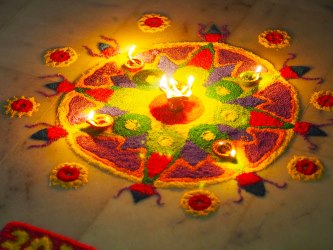Deepavali

Commonly known as the Festival of Lights, the celebration of Deepavali (or
Diwali) marks the triumph of good over evil, the victory of light over dark.
Gazette by the Government as a one-day public holiday, it is celebrated here in
Malaysia by the Hindu community - mainly consisting those of Indian ethnic
origin - during the seventh month of the Hindu lunar calendar, which usually
falls in either October or November.
And it is not called the Festival of Lights for nothing, for it is celebrated
with a joyful vivacity, with bright lights and even brighter smiles, as though
to underline the traditional meaning and message behind it.
Even the word "Deepavali"
is etymologically derived from the Sanskrit word that literally means "row of
lights".
Deepavali owes its origins to the epic stories narrated in the Hindu religious
scriptures. Perhaps the most popular origin story is recounted in the Ramayana
in which Lord Rama reunites with his wife Sita following a 14-year exile, and
after having killed the demon king Ravana.
In the epic tale, the denizens of the kingdom of Ayodhya celebrated the prince's
triumphant return to his homeland and later, his ascension to the throne, by
lighting up their homes and the streets with earthen oil lamps. This happened on
the night of the new moon and is commemorated hence, as the celebration of
Deepavali. However, the story of Lord Rama's victory over Ravana is only one out
of many that is said to have given rise to this annual celebration.
One other popular tale remembered during the occasion is that of the battle
between Lord Krishna and the evil asura (demon) Narakasura. Krishna emerged
victorious after a long and drawn-out struggle, and his victory was celebrated
with the lighting of lamps. Yet others believe that Deepavali marks the day when
the prideful and evil Mahishasura was vanquished at the hands of the goddess
Kali. Variations notwithstanding, these stories share a common thread; that of
the removal of evil, to be replaced by that which is good. This sense of renewal
is reflected in the way Hindus prepare themselves for Deepavali.
In anticipation of the celebration, homes as well as their surrounding areas are
cleaned from top to bottom; decorative designs such as the kolam are drawn or
placed on floors and walls; and the glow of lights, whether emitted from the
traditional vilakku (oil lamps fashioned out of clay) or colourful electric
bulbs, brighten up the abode of both rich and poor, signalling the coming
festivities.
undo Malaysian Festivals